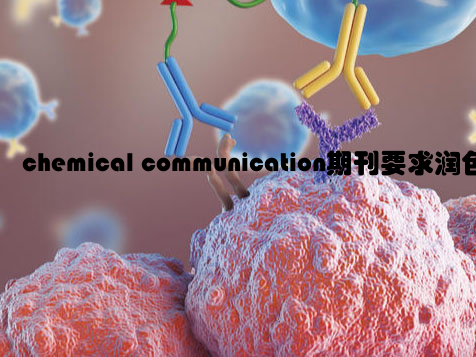Chemical Communication: Does the Journal Require Proofreading?
When it comes to the submission of research papers to reputable journals like Chemical Communication, many scientists often wonder whether the journal requires proofreading before the final submission. This is an important question as the quality of the published works can significantly impact the credibility and impact of the scientific community. In this article, we will explore the importance of proofreading in scientific publishing and whether journals like Chemical Communication have specific requirements in this regard.

The Role of Proofreading in Scientific Publishing
Proofreading plays a crucial role in scientific publishing as it ensures that the research papers are presented in a clear, accurate, and grammatically correct manner. The process involves carefully reviewing the content for spelling, grammar, punctuation, and formatting errors to enhance the overall readability and professionalism of the paper. Additionally, proofreading helps to identify any inconsistencies or ambiguities in the text, thereby improving the clarity and coherence of the scientific findings.
Given the rigour and precision required in scientific research, the need for accurate and polished writing is paramount. A well-proofread paper not only reflects positively on the author’s professionalism but also ensures that the research is effectively communicated to the readers, facilitating a deeper understanding and appreciation of the scientific work.
Chemical Communication’s Requirements on Proofreading
As a leading journal in the field of chemical sciences, Chemical Communication upholds high standards of quality and accuracy in the manuscripts it publishes. While the journal does not explicitly require proofreading before submission, authors are strongly encouraged to ensure that their papers are thoroughly proofread to meet the journal’s standards of excellence.
Authors should carefully review their manuscripts to eliminate any language-related errors and to ensure that the content is presented in a clear and concise manner. This attention to detail reflects the commitment of the authors to maintaining the integrity of their research and the reputation of the journal.
Benefits of Professional Proofreading
Engaging the services of a professional proofreader can provide several advantages to authors intending to submit their work to Chemical Communication. A skilled proofreader can not only rectify grammatical and typographical errors but also offer valuable insights into the clarity, coherence, and overall impact of the manuscript.
Furthermore, professional proofreading can help authors identify and correct any technical inaccuracies or inconsistencies in the scientific content, ensuring that the research findings are accurately represented. This level of attention to detail can significantly enhance the manuscript’s readability and impact, ultimately contributing to its acceptance and positive reception within the scientific community.
Conclusion
In conclusion, while Chemical Communication does not explicitly mandate proofreading, authors should recognize the critical role that proofreading plays in ensuring the quality and effectiveness of their scientific communication. By meticulously reviewing and refining their manuscripts, authors can demonstrate their dedication to excellence and contribute to the advancement of knowledge in the field of chemical sciences. Ultimately, the investment in professional proofreading can greatly enhance the chances of acceptance and wider dissemination of the research in reputable journals like Chemical Communication.



